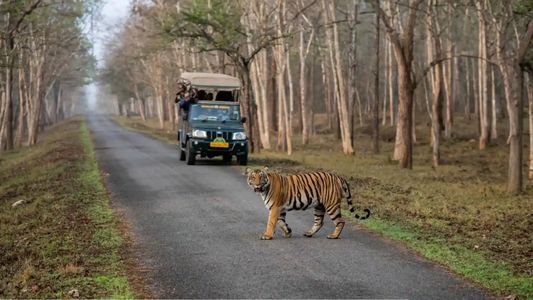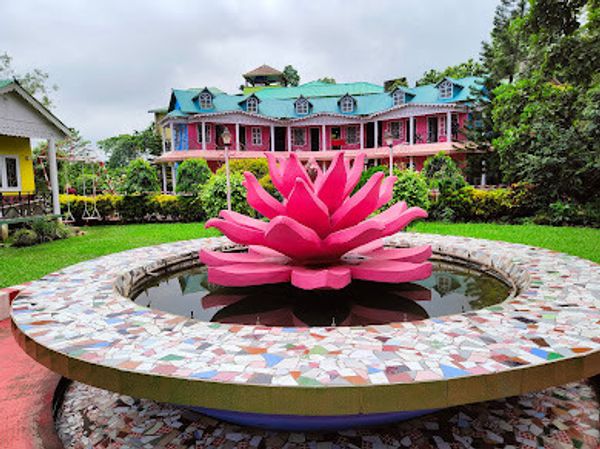Roars and Rivers: Exploring Kabini’s Wildlife and Vibrant Ecosystem
 Palakshi Meharwal
25 Apr, 2025
8 mins read
29
Palakshi Meharwal
25 Apr, 2025
8 mins read
29

Tucked away in the lush belt of the Nilgiri Biosphere Reserve, Kabini is more than just a dot on the wildlife tourism map of southern India—it is a symphony of life, where the sounds of roaring tigers blend seamlessly with the gentle ripple of the river. Located near the town of Mysuru in Karnataka, Kabini’s vibrant ecosystem serves as a sanctuary for a diverse array of species and a haven for nature lovers seeking a closer connection to the wild.
The Heart of Kabini: A Natural Treasure Trove
Kabini, once the private hunting ground of the Mysore Maharajas, now stands as one of the most prominent wildlife destinations in India. Centered around the Kabini River, which flows into the larger Cauvery River, the region supports dense forests, grasslands, and marshy backwaters. These varied habitats form a unique ecological mosaic, supporting an incredible range of biodiversity.
What makes Kabini truly special is its seamless blend of forest and riverine ecosystems. This creates ideal conditions for both terrestrial and aquatic species, making the area a rich zone of biological activity. The Nagarhole National Park, which borders the Kabini region, is part of a larger tiger conservation landscape and plays a crucial role in maintaining the ecological balance.
Wildlife Wonders: A Glimpse Into Kabini’s Fauna
Kabini is synonymous with thrilling wildlife encounters. While many come here with hopes of spotting a tiger in the wild, the area offers so much more. One of its greatest attractions is the black panther, an elusive and melanistic variant of the leopard, which has gained fame in recent years thanks to documentary features and expert photographers.
Other prominent residents of the forest include:
- Asian elephants: Kabini is one of the best places in India to observe large herds of elephants in their natural habitat. During summer months, they congregate around the river, offering a rare and spectacular sight.
- Indian leopards: Agile and elusive, they often inhabit the upper canopies or are seen lounging on tree branches during the heat of the day.
- Bengal tigers: Though shy and rarely seen, their presence is a strong indicator of a healthy ecosystem.
- Dhole (Indian wild dog): These highly social predators are often seen hunting in packs, a remarkable display of coordination and strength.
- Over 300 species of birds: Kabini is a birder’s paradise, with species ranging from Malabar pied hornbills and crested serpent eagles to great cormorants and kingfishers.
The River That Sustains Life
The Kabini River is more than just a scenic backdrop—it is the lifeline of the region. Flowing from the Western Ghats, the river meanders through the landscape, feeding forests, wetlands, and wildlife alike. Its backwaters, formed by the Kabini Reservoir, expand during monsoon and contract during the dry season, revealing vast grasslands that attract herds of grazing animals.
These changes in water levels create a dynamic habitat, influencing the migration patterns of birds and the movement of larger mammals. In fact, the seasonal congregation of elephants at the Kabini backwaters is considered one of the largest in Asia, offering unmatched viewing opportunities.
Ecotourism and Conservation: A Delicate Balance
Tourism in Kabini National Park has grown significantly over the last decade, with a range of eco-resorts and forest lodges offering sustainable wildlife experiences. However, with increased footfall comes the challenge of balancing human presence with wildlife conservation.
Authorities under the Karnataka Forest Department have implemented strict guidelines to regulate safari timings, limit vehicle numbers, and ensure minimal disturbance of natural habitats. Tour operators often collaborate with local communities to raise awareness about the importance of conservation, contributing to both environmental protection and local livelihoods.
Additionally, initiatives led by conservation groups have focused on preserving corridors that allow animals to migrate safely between forest patches, ensuring long-term genetic diversity and population stability.
When to Visit Kabini: Timing Your Journey
The dry months from February to May are generally considered the best for wildlife sightings, as animals congregate around water sources. However, the monsoon season (June to September) transforms Kabini into a lush green sanctuary, making it ideal for photography and birdwatching, though sightings of large predators may become less frequent.
Each season offers a distinct experience, and depending on your interest—whether it’s big cats, birds, or landscapes—you can plan accordingly.
How to Reach Kabini
Kabini is easily accessible from major cities:
- By Road: Roughly 220 kilometers from Bangalore and 80 kilometers from Mysuru. Well-maintained roads connect visitors to most resorts near the river.
- By Rail: The nearest railway station is Mysuru, from where one can take a taxi or bus to Kabini.
- By Air: The closest airport is Kempegowda International Airport in Bengaluru. Mysuru also has a smaller domestic airport with limited services.
Final Thoughts: A Wild Symphony of Life
Exploring Kabini isn’t just about ticking animals off a list. It’s an immersion into a world where every sound—from the trumpeting of elephants to the cry of a distant langur—tells a story. The interplay between river and forest, the balance of predator and prey, and the harmony between humans and nature make Kabini a destination worth preserving.
Written By:
Palakshi Meharwal



Hotels at your convenience
Now choose your stay according to your preference. From finding a place for your dream destination or a mere weekend getaway to business accommodations or brief stay, we have got you covered. Explore hotels as per your mood.


